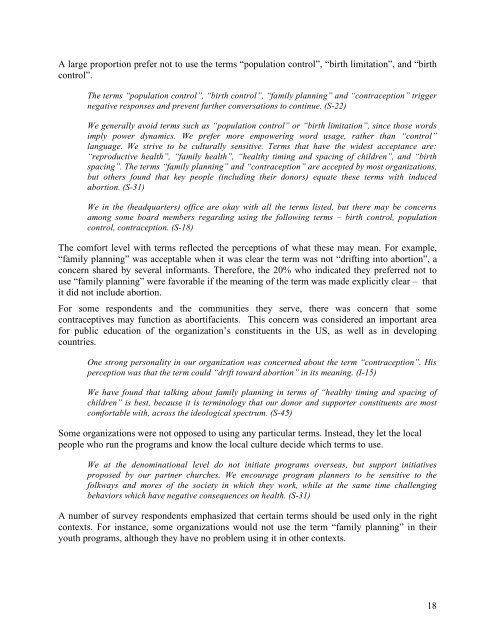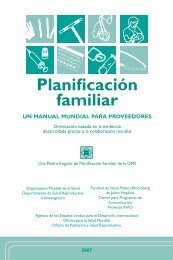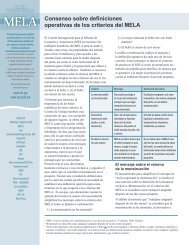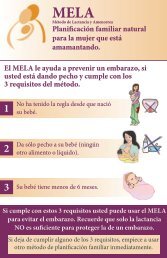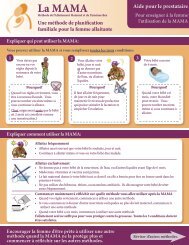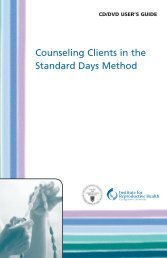International Family Planning: Christian Actions and Attitudes
International Family Planning: Christian Actions and Attitudes
International Family Planning: Christian Actions and Attitudes
- No tags were found...
You also want an ePaper? Increase the reach of your titles
YUMPU automatically turns print PDFs into web optimized ePapers that Google loves.
A large proportion prefer not to use the terms “population control”, “birth limitation”, <strong>and</strong> “birth<br />
control”.<br />
The terms “population control”, “birth control”, “family planning” <strong>and</strong> “contraception” trigger<br />
negative responses <strong>and</strong> prevent further conversations to continue. (S-22)<br />
We generally avoid terms such as “population control” or “birth limitation”, since those words<br />
imply power dynamics. We prefer more empowering word usage, rather than “control”<br />
language. We strive to be culturally sensitive. Terms that have the widest acceptance are:<br />
“reproductive health”, “family health”, “healthy timing <strong>and</strong> spacing of children”, <strong>and</strong> “birth<br />
spacing”. The terms “family planning” <strong>and</strong> “contraception” are accepted by most organizations,<br />
but others found that key people (including their donors) equate these terms with induced<br />
abortion. (S-31)<br />
We in the (headquarters) office are okay with all the terms listed, but there may be concerns<br />
among some board members regarding using the following terms – birth control, population<br />
control, contraception. (S-18)<br />
The comfort level with terms reflected the perceptions of what these may mean. For example,<br />
“family planning” was acceptable when it was clear the term was not “drifting into abortion”, a<br />
concern shared by several informants. Therefore, the 20% who indicated they preferred not to<br />
use “family planning” were favorable if the meaning of the term was made explicitly clear – that<br />
it did not include abortion.<br />
For some respondents <strong>and</strong> the communities they serve, there was concern that some<br />
contraceptives may function as abortifacients. This concern was considered an important area<br />
for public education of the organization’s constituents in the US, as well as in developing<br />
countries.<br />
One strong personality in our organization was concerned about the term “contraception”. His<br />
perception was that the term could “drift toward abortion” in its meaning. (I-15)<br />
We have found that talking about family planning in terms of “healthy timing <strong>and</strong> spacing of<br />
children” is best, because it is terminology that our donor <strong>and</strong> supporter constituents are most<br />
comfortable with, across the ideological spectrum. (S-45)<br />
Some organizations were not opposed to using any particular terms. Instead, they let the local<br />
people who run the programs <strong>and</strong> know the local culture decide which terms to use.<br />
We at the denominational level do not initiate programs overseas, but support initiatives<br />
proposed by our partner churches. We encourage program planners to be sensitive to the<br />
folkways <strong>and</strong> mores of the society in which they work, while at the same time challenging<br />
behaviors which have negative consequences on health. (S-31)<br />
A number of survey respondents emphasized that certain terms should be used only in the right<br />
contexts. For instance, some organizations would not use the term “family planning” in their<br />
youth programs, although they have no problem using it in other contexts.<br />
18


